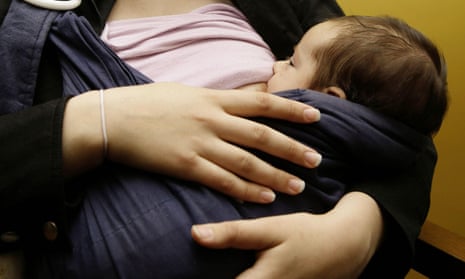Social pressure on new mothers to get their babies into a feeding routine and to sleep through the night is a key factor in why the UK has the lowest rate of breastfeeding in the world, an expert has warned.
Speaking at the British Science Festival, Amy Brown of Swansea University said not enough was being done to support new mothers to breastfeed. In particular, she said, advice given to mothers to impose a feeding regime whereby babies don’t feed frequently, contributed to why many women felt that they weren’t producing enough milk and abandoned breastfeeding.
“One of the key things about breastfeeding is that you have to feed the baby very regularly,” Brown, a GP and member of the department of public health, policy and social sciences at Swansea University, told the Guardian. “That’s easily every two hours.”
But, she says, that doesn’t chime with common advice.
“We are told by so-called experts that you should get your baby in a feeding routine and your baby should not wake up at nights,” said Brown. “But that is really incompatible for breastfeeding. If you try and feed them less, you make less milk. You need to feed at night to make enough milk.”
Elizabeth Duff, senior policy adviser at the National Childbirth Trust, agreed that frequent feeding is necessary. “It is obviously easier for everyone if they begin to sleep more during the night, but if you are fully breastfeeding you will have to feed for at least once and probably two or three times during the night,” she said. “The daily patterns will come, but it won’t be in the first few days or the very first weeks.”
Duff agrees that mothers are not given enough support to breastfeed. “Understanding a bit about the physiology of breastfeeding can be really helpful,” she added. “Some women who have not been able to find that information think that the baby isn’t getting very much [milk, but] a couple of teaspoons-worth is probably enough at any one time.”
According to a recent report published in the Lancet, the UK has the lowest rate of breastfeeding in the world, with only 1 in 200 women breastfeeding their children after they reach their first birthday. The World Health Organization (WHO) recommend just breast milk for six months, with breastfeeding to form part of a baby’s diet up to two years of age.
“We have known that breastfeeding rates aren’t great in the UK for a long time,” said Brown. “We have about 80% of women starting breastfeeding at birth, but by the end of the first week, over half of those babies have had formula in some way.”
Speaking ahead of the publication of her book, Breastfeeding Uncovered, Brown said that while a large proportion of mothers struggle to breastfeed, few of them have underlying conditions that prevent the process.
Surveying around 300 women who had stopped breastfeeding in the first six months, Brown found that around 80% cited pain and difficulty as contributing, while 40% referenced public attitudes, 60% lack of support from others and 20% blamed embarrassment.
“The vast majority of women who are having problems, it isn’t really to do with a primary inability to breastfeed, it is to do with their experience,” said Brown. “Eighty per cent of women who stop breastfeeding in the first six weeks do not want to. They want to keep breastfeeding but they feel that they can’t.”
Among the issues faced by new mothers, Brown criticised aggressive advertising by formula companies, and negative public perceptions of breastfeeding that have seen women asked to cover up when feeding their baby. “Babies have to breastfeed in public – it is called eating,” said Brown.
Duff agrees that breastfeeding should be welcomed. “Everywhere should be parent friendly and baby-feeding friendly,” she said.
Pressures on women to return to their pre-baby lives is also part of the problem, said Brown, while cuts affecting funding for breastfeeding peer support groups, as well as cuts to midwife services and the NHS more widely, are limiting help for new mothers.
“The way forward is that we need a complete societal change to how we look at breastfeeding, how we accept it, but also how we accept and value mothering in general,” said Brown, adding that raising breastfeeding rates could save the NHS millions due to a reduction in common infant infections. “Women should not be held responsible for this, is the key message,” she added. “We need to raise breastfeeding rates, but it is not their fault.”
Rebecca Schiller, director human rights for childbirth charity Birthrights, said it is of great concern that many women were giving up breastfeeding sooner than they wished, and criticised a lack of support for new mothers. “I think it is a huge cruelty to women to tell them that there is something wonderful that they should be doing and then to make it very difficult for them to do that,” she said. “We also don’t think that anyone should be pressured into feeding in any particular way.”
Dr Nigel Rollins from the department of maternal, newborn, child and adolescent health at WHO, said it was important to acknowledge that breastfeeding can be challenging, and criticised negative public attitudes to breastfeeding, particularly in England. What’s more, he said, whether a particular routine is adopted varies greatly between babies.
“This sense that ‘achieving’ or ‘accomplishing’ breastfeeding is the responsibility only of the mother and therefore [a] judgement as to whether she is ‘adequate’ or not, I think is one that I would counter strongly,” he said. “There are so many things that make it more manageable to breastfeed than not,” he added, pointing out that lack of support from a partner, family, health worker and even negative comments from neighbours can all play a role in making it harder. “All of those things chip away at a woman’s confidence as to whether she has enough milk,” he said.







Comments (…)
Sign in or create your Guardian account to join the discussion